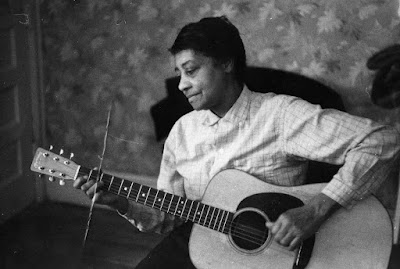Elizabeth "Libba" Cotten (née Nevills) (January 5, 1893 - June 29, 1987) was an American blues and folk musician, singer, and songwriter. A self-taught left-handed guitarist, Cotten developed her own original style. She played a guitar strung for a right-handed player, but played it upside down, as she was left-handed. This position meant that she would play the bass lines with her fingers and the melody with her thumb.
Cotten was born in 1893 to a musical family near Chapel Hill, North Carolina, in an area that would later be incorporated as Carrboro. At age 9, she was forced to quit school and began work as a domestic. At the age of 12, she had a live-in job at Chapel Hill. She earned a dollar a month, that her mother saved up to buy her first guitar. The guitar, a Sears and Roebuck brand instrument, cost $3.75 (equivalent to $107 in 2019). Although self-taught, she became proficient at playing the instrument, and her repertoire included a large number of rags and dance tunes. By her early teens, she was writing her own songs, one of which, "Freight Train", became one of her most recognized. She wrote the song in remembrance of a nearby train that she could hear from her childhood home. The 1956 UK recording of the song misappropriated by Chas McDevitt and Nancy Whiskey was a major hit and is credited as one of the main influences on the rise of skiffle in the UK. Under the advocacy of the influential Seeger family, the copyright was eventually restored to Cotten. Nevertheless, it remains mis-credited in many sources.
Cotten retired from playing the guitar for 25 years, except for occasional church performances. She did not begin performing publicly and recording until she was in her 60s. She was discovered by the folk-singing Seeger family while she was working for them as a housekeeper. In the later half of the 1950s, Mike Seeger began making bedroom reel-to-reel recordings of Cotten's songs in her house. These recordings later became the album Folksongs and Instrumentals with Guitar, which was released by Folkways Records. Since the release of that album, her songs, especially her signature song, "Freight Train" - which she wrote when she was a teenager - have been covered by Peter, Paul, and Mary, Jerry Garcia, Bob Dylan, Joe Dassin, Joan Baez, Devendra Banhart, Laura Gibson, Laura Veirs, His Name Is Alive, Doc Watson, Taj Mahal, Geoff Farina, and Country Teasers.
Shortly after that first album, she began playing concerts with Mike Seeger, the first of which was in 1960 at Swarthmore College. In the early 1960s, Cotten went on to play concerts with some of the big names in the burgeoning folk revival. Some of these included Mississippi John Hurt, John Lee Hooker, and Muddy Waters at venues such as the Newport Folk Festival and the Smithsonian Festival of American Folklife. The newfound interest in her work inspired her to write more songs to perform, and in 1967 she released a record created with her grandchildren, which took its name from one of her songs, "Shake Sugaree". The song featured 12-year-old Brenda Joyce Evans, Cotten's great-grandchild, and future Undisputed Truth singer.
Cotten died in June 1987, at Crouse-Irving Hospital in Syracuse, New York, at the age of 94.
